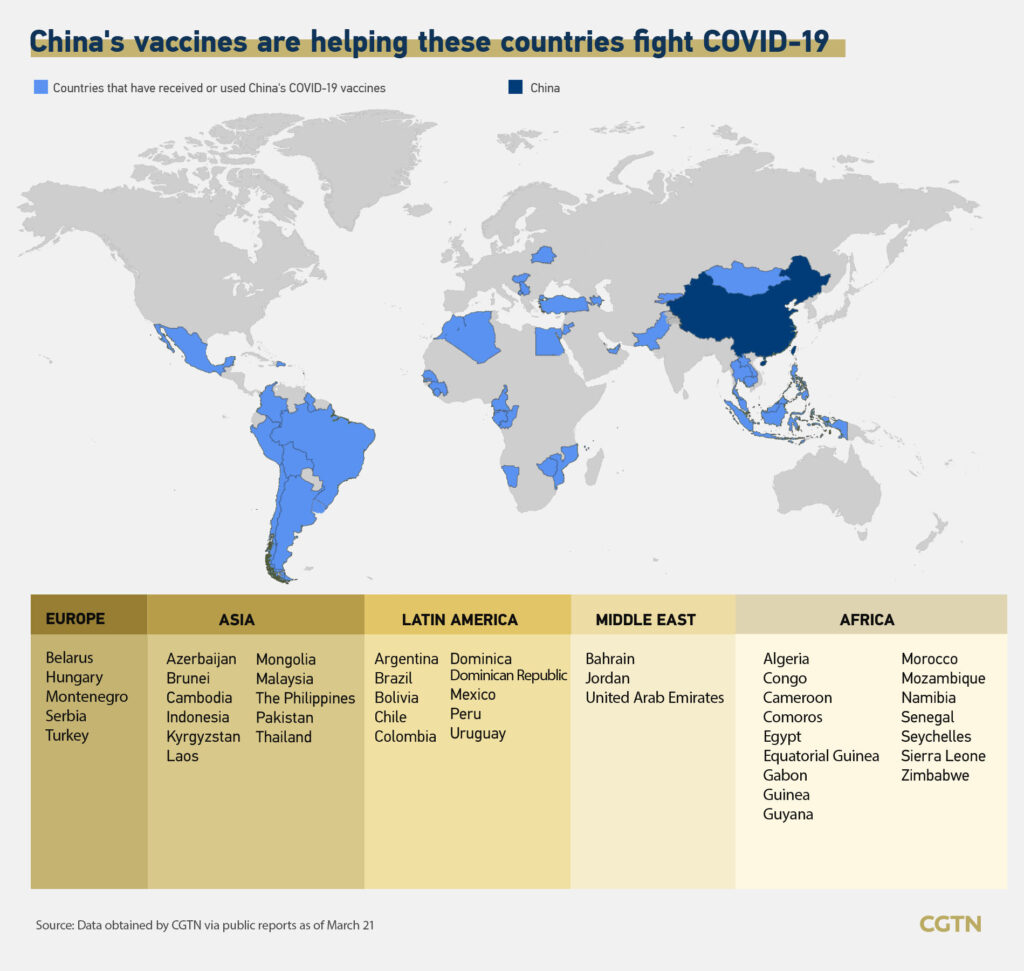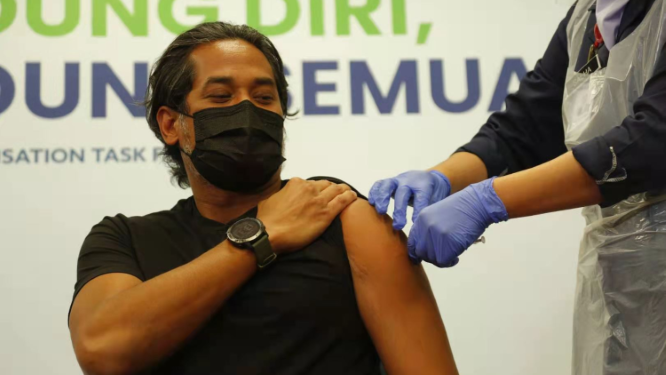Beijing, March 22 (CGTN): The fight against the COVID-19 pandemic is the most pressing task facing the world today. Vaccines are the most powerful weapon to win the battle. China attaches great importance to the equitable distribution of vaccines, especially the accessibility and affordability in developing countries.
Ambassador Zhang Jun, China’s permanent representative to the United Nations, sent a letter on March 15 to UN Secretary-General Antonio Guterres, informing him of China’s decision to donate 300,000 doses of COVID-19 vaccines to UN peacekeepers, with priority given to the peacekeeping missions in Africa.
This is a further step to make China’s vaccines a global public good, and also a demonstration of China’s firm and continuous support of the UN and multilateralism.
As of Sunday, China has provided vaccine assistance to dozens of countries and several international organizations. More and more countries and people are benefiting from China’s vaccines.
China is providing and will offer vaccine assistance to 80 countries and three international organizations, the first large-scale assistance of its kind, the country’s International Development Cooperation Agency said on Friday.
The vaccines are being donated to a wide range of countries from five continents in a timely and orderly manner, including 26 in Asia and 34 in Africa, the agency’s spokesperson Tian Lin said in an interview.
The country also offered vaccine doses to the African Union, the Arab League and the United Nations Peacekeepers, Tian said.
China has acted swiftly to donate the vaccine doses, he said, adding that the nation is also providing injection devices to countries facing difficulties.
So far, over 60 countries have authorized the registration or emergency use of Chinese vaccines, and many foreign politicians have been inoculated with Chinese vaccines, including the president and prime minister of Hungary, Presidents of Pakistan, Chile, Indonesia and Turkey, which Tian said is a vote of confidence in the security and effectiveness of Chinese vaccines.
China applies the strictest quality control measures with regard to its vaccines and ensures the timely delivery of high-quality vaccines, he said.
The moves aim to implement the promise made by President Xi Jinping at the opening of the 73rd session of the World Health Assembly via video link last year that COVID-19 vaccine development and deployment in China, when available, will be made a global public good.
The ongoing assistance is provided to ensure developing countries have fair and timely access to vaccines, and is based on the pandemic situation and the specific needs of related countries, he said.
China provides the assistance to help developing countries save lives, to which it attaches no political strings and has nothing to do with geopolitics, he said.
China is not a savior, but tries to be a friend in need, a sincere partner to be counted on in times of difficulty.
Tian called for efforts to promote the fair distribution of vaccines around the globe. He noted that while high-income countries have quickly acquired a large number of vaccine doses, there are fewer opportunities for poor nations to obtain vaccines.
He said that China firmly opposes selfish behavior such as hoarding, monopolies and “vaccine nationalism”, and hopes the international community will do more that is conducive to global cooperation in combating the pandemic.
Vaccine assistance will not affect domestic inoculation, he said, adding that China always offers foreign aid according to the principle of doing the utmost within its capabilities.
A batch of Chinese COVID-19 vaccines departed Beijing for Benin on Saturday, and another batch departed Beijing for Niger on Friday.
The following are the latest updates on China’s contributions to global vaccine distribution over the past week.
Egypt received the second batch of donated Chinese COVID-19 vaccines on early Saturday morning, according to Egyptian health authorities. Officials said medical staff, those suffering from chronic diseases and the elderly will be the first in line to get vaccinated. The first batch of donated Chinese vaccines arrived in the country on February 23.
Kyrgyz Prime Minister Ulukbek Maripov speaks at the donation ceremony of China’s Sinopharm vaccine at the Manas International Airport in Bishkek, Kyrgyzstan, March 19, 2021. /Xinhua
The first batch of COVID-19 vaccines donated by China arrived Kyrgyzstan on Friday. Kyrgyz Prime Minister Ulukbek Maripov thanked the Chinese government for its assistance to the country’s battle against the COVID-19 pandemic, saying China was one of the first countries to provide anti-pandemic assistance and the vaccine donation once again illustrated the friendship between the two countries.
He added that the vaccine from China has received wide recognition in the international community. The first stage of vaccination in the country will begin in late March or early April, according to the Ministry of Health of Kyrgyzstan.
Cameroon on March 15 received a batch of medical equipment donated by China to fight against the novel coronavirus. The donation, which includes ventilators, oxygenerators and electrocardiographs, is part of the cooperation mechanism between Chinese and African hospitals, an initiative proposed by China to help Africa in the field of health.
“This donation comes at the right time. We are all together in the fight against COVID-19, a difficult fight for health personnel,” said Hassan Ben Bachir, head of the cooperation division of the Ministry of Public Health. “We can only thank the Chinese government.”
Pakistan on Wednesday received the second batch of COVID-19 vaccines donated by the Chinese government. Special Assistant to the Pakistani Prime Minister on Health Faisal Sultan thanked the Chinese government for once again providing COVID-19 vaccine aid to Pakistan.
The newly arrived Sinopharm vaccine doses are crucial to the further implementation of Pakistan’s vaccination drive, he said, adding the efficacy and safety of the Sinopharm vaccine are very good. The country officially launched its National COVID-19 Immunization Program shortly after receiving the China-donated Sinopharm vaccines, with the frontline healthcare workers first inoculated.
Malaysia started administering COVID-19 vaccine doses made by Chinese biopharmaceutical company Sinovac Biotech on Thursday. It’s Science, Technology and Innovation Minister Khairy Jamaluddin became the first recipient of Sinovac’s CoronaVac vaccine in the country.
Khairy told a press conference he was feeling well after getting the shot and stressed that the Sinovac vaccine had been used in many countries and by state leaders. Malaysia received a batch of finished Sinovac vaccine doses from China on March 15. Another shipment is expected later this month.
The Dominican Republic received shipments of two Chinese vaccines on Wednesday, allowing the Caribbean nation to advance its immunization plan against the coronavirus, authorities said. The shipment contained doses of Sinopharm vaccines with syringes donated by the Chinese government and doses of Sinovac vaccines purchased by the government of the Dominican Republic.

“With Chinese vaccines, the Dominican Republic again sees hope and light at the end of the tunnel in the fight against the novel coronavirus,” said the country’s Vice President Raquel Pena.
A Chinese medical aid team, consisting of 12 medical experts, arrived in the Union of the Comoros on Wednesday to help it fight against COVID-19. A batch of COVID-19 vaccines and medical supplies provided to Comoros by the Chinese government also arrived on the same flight.
Comoros’s President Azali Assoumani expressed gratitude to China’s kindness and saluted the fraternal and generous gesture which he said will allow the country to further strengthen its fight against the COVID-19 pandemic and protect the Comorian population even more effectively. The 12 experts will cooperate with their Comorian counterparts in a three-month anti-epidemic assistance mission.
The Namibian government on Friday started to roll out its COVID-19 inoculation program following the arrival of the Sinopharm vaccines donated by the Chinese government. Deputy Minister of Health Utjiua Muinjangue became the first person in the country to receive the injection, kicking off the vaccination campaign that aims to vaccinate over 60 percent of Namibia’s 2.5 million people.
The vaccines will be distributed in the country’s Khomas and Erongo regions, and the first phase of the vaccination period will run from March 19 to April 19.
Zimbabwe on Tuesday received a second batch of Sinopharm doses donated by China plus an additional batch of Sinovac doses commercially procured by the government. “This is yet another huge milestone in our country’s steady path back to normality. Thank you to @China_Amb_Zim for China’s continued partnership in supplying these lifesaving medicines,” Zimbabwean President Emmerson Mnangagwa tweeted.
The latest delivery of vaccines will allow Zimbabwe to kick-start its second phase of the inoculation program, which will target teachers, religious leaders, the judiciary, law and order, and those with underlying conditions. The first phase of Zimbabwe’s vaccination program started on February 18 after the country received the first batch China-donated Sinopharm vaccines.
The COVID-19 vaccine developed by China’s Sinopharm has been approved for emergency use in the Maldives, the Maldives Food and Drug Administration (MFDA) announced on March 15 afternoon.
The vaccine made by China National Pharmaceutical Group (Sinopharm) will be given to people aged between 18 and 60, local media reported, citing an MFDA official. The MFDA also announced that the vaccine made by Pfizer has also been approved for emergency use.
The third batch of 100,000 doses of China’s Sinopharm COVID-19 vaccine arrived in Budapest on Wednesday, six weeks earlier than the agreed deadline. The first shipment purchased by Hungary arrived in Budapest on February 16 and the second on March 11.
Hungary, the first European Union member state to buy Chinese vaccines and authorize their use, started to administer the Sinopharm vaccines on February 24. Hungary has so far recorded 532,578 COVID-19 infections and 17,421 related deaths.
END





























































